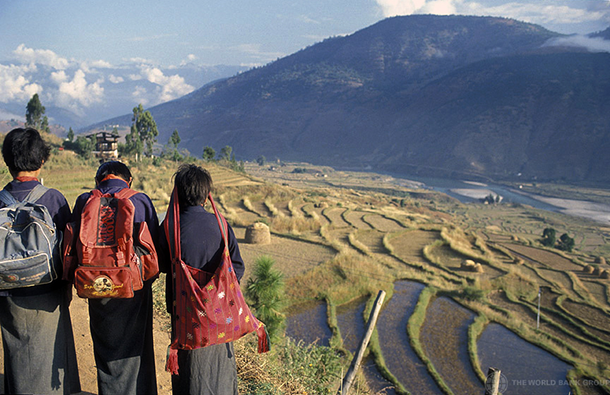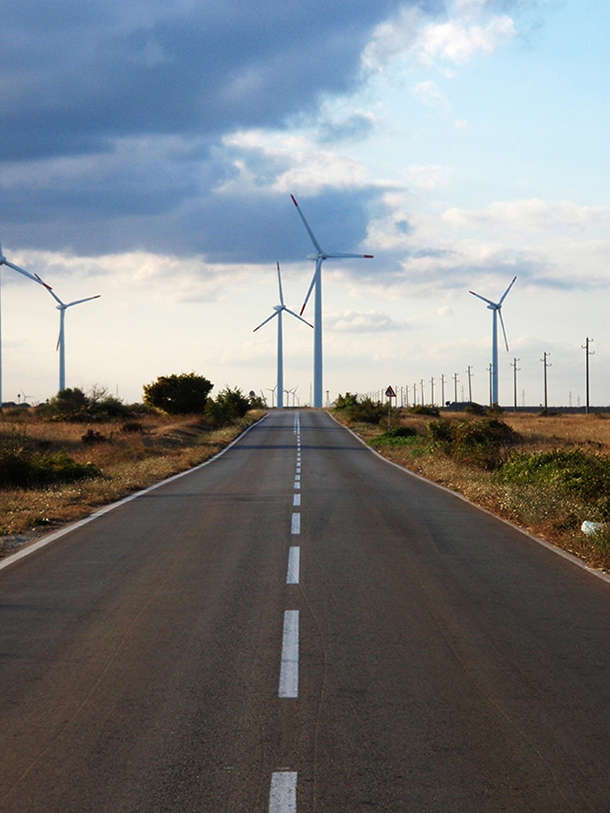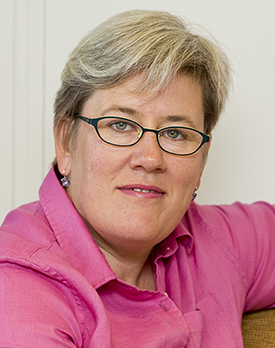Paving the Path to Paris with Gold
Air Date: Week of November 27, 2015

Climate change threatens to put as many as 100 million people back into poverty by 2030, according to a recent World Bank estimate. (Photo: Curt Carnemark / World Bank, Flickr CC BY-NC-ND 2.0)
Around the world, both public and private sources are promising to fund action on climate change, and help vulnerable nations adapt to and mitigate the effects of global warming. An important source of support is the World Bank. Living on Earth’s Helen Palmer spoke with Rachel Kyte, the Bank’s Special Envoy for Climate Change, about the sources and aims of the available finance.
Transcript
CURWOOD: It’s Living on Earth. I'm Steve Curwood. The World Bank finances major infrastructure for developing countries with a primary focus on reducing poverty. And in recent years the World Bank has recognized the need to address climate change and has stopped lending money for coal-fired power plants. Rachel Kyte is now the World Bank’s special envoy for climate change, and she recently spoke with Living on Earth’s Helen Palmer.
PALMER: Rachel Kyte, you're the vice president and special envoy for climate at the World Bank. Tell me first of all, we're just about to go into Paris, where we at in terms of getting the kind of agreement we need?
KYTE: Well, I think we're in a quite interesting position because there is an extraordinary momentum around climate action from initiatives being announced on almost a daily basis from the private sector to different initiatives of governments; civil societies mobilized—there are people walking from every corner of the Earth towards Paris. And then there's the negotiation process, which is always inextricably difficult and which some people have deep concerns that there's far too much text, which is still undecided. But we have to at this point rely upon the diligence and the craft of the French as hosts of the COP in terms of shepherding the diplomacy forward, but at the same time, the decision to bring heads of state at the beginning rather than at the end is an extraordinary signal that the political space for negotiators to not focus on an ambitious text has been removed.
PALMER: So, that's what they're doing right in Paris, bringing people in the beginning? They've also got some pre-agreements that seem very strong.
KYTE: Yes, so the heads of state will be in Paris on the opening day, and I would expect to see some very strongly-worded, declarative statements from the heads of state with a clear signal that these are leaders that are prepared to lead. And in the run-up, we have a G-20; we have a commonwealth heads of government meeting as well. We have bilateral diplomacy with the French and others traveling the world. It's an extraordinary diplomatic effort of the like of which we haven't seen before.
PALMER: So, do you think we all going to end up with a strong actual agreement at the end of Paris?
KYTE: So we're going to end up with a package deal, and the package deal will include a negotiated text and I hope that that's a strong and ambitious text but it's too early to tell. There will be some kind of critical declaration, which I believe will speak clearly to the rest of the world and to the global markets—in terms of, this is the direction of travel and this is where you should be thinking about investing for the future. We will be see remarkable commitments to action from a number of working coalitions of public and private sectors working together on specific issues as part of an action plan, and there will be a financial package. Underpinning all of that is what they call these intended nationally determined contributions, which is a bottom-up—as opposed to a top-down—process where every country has filed with the UN basically a first generation investment prospectus for low carbon growth.
PALMER: The working parties...these are about what kind of issues?
KYTE: So these coalitions of the working, as we call them, coalitions of the willing—having different connotations—are really where a number of governments and companies from across different sectors of industry and civil society got together and said, "look, this is an issue that really needs to move forward. We need to act on this, and we're not going to or can't wait for an emerging consensus to come." So whether it's on short-lived climate pollutants, black carbon, methane, hydrofluorocarbons and the clean air coalition that grew up around that...forestry, tropical forest alliance, all kinds of companies with extended supply chains saying, “We are going to end deforestation in the supply chain no matter what the REDD and REDD plus agreement says in the convention, sustainable energy for all. More than 80 countries and thousands of other groups and companies coming together and saying, “We're going to deliver clean energy. We're going to increase the amounts renewables in the mix, and we're going to have a revolution in energy efficiency.” So there are across a spectrum of issues often outside of the convention these remarkable working coalitions now formed and making very substantial pledges.

By 2020, the World Bank expects to channel $29 billion into climate finance every year, funding renewable energy projects, adaptation, and more. (Photo: World Bank, Flickr CC BY-NC-ND 2.0)
PALMER: What's the role of the World Bank in all this?
KYTE: We're very pleased to be a partner in many of these coalitions. We see how climate change is threatening our underlying mission to end poverty and build prosperity. And so responding to our clients needs—developing countries and private sector—we've had to completely rethink the way we do our business. At the same time, we are a very important channel of climate finance and recently agreed to increase by 40 percent our financing, so that we, by 2020, expect to channel $29 billion worth of public finance every year. This is actually a separate channel from the Green Climate Fund. So if you look at what's flowing today, the OECD has estimated that's $62 billion dollars flowing every year. Probably half of that comes through different multinational development banks including the World Bank group, and then there's the $10 billion in the Green Climate Fund, but not all of that is flowing yet. So the Green Climate Fund like any financial situation is slowly getting off the mark and has just last week making its first commitments of financings, different projects. I think what we need is climate finance to flow. We need development finance to be climate smart, and we need of all that to leverage private co-financing.
PALMER: It still leaves out the adaptation part. Do you expect there will be a robust agreement on adaptation at Paris?
KYTE: I think that from the financial perspective, the minority of that $62 billion dollars is going into adaptation, and so I think there are two immediate issues: One is how to make sure that more climate finance goes into adaption, and then remember that everything we're negotiating in Paris is for 2020 on. This is 2015. We have an immediate need to boost financing into resilience and adaptation now over the next five years because we know that the climate impacts are going to become more and more profound every year. We are going to lose lives, and we're going to lose enormous amounts of GDP growth. And so every investment that we can make in resilience will save us funding in relief and reconstruction but it will save us lives too.

Rachel Kyte is World Bank Group Vice President and Special Envoy for Climate Change. (Photo: World Bank Group)
PALMER: The World Bank very recently released a report that said it expected another hundred million people in severe poverty by 2030 as a result of climate change. Do you think this is something that can be diverted?
KYTE: We're in the business of solutions working with our clients, and so we believe that the kind of aggressive action to mitigate climate change and concentrated investment in adaptation can make those numbers a distant threat rather than a reality. This means that countries have to do the things that are not rocket science and the need to do them soon and need to do them well. So, we want to see carbon prices in all economies. We want to see the harmful subsidies removed in both fossil fuels and agriculture. We want to see smart economic management with long-term consistent signals that will allow the private sector and public procurement to move into lower carbon solutions. It's not easy. No country has ever walked this path before, but a lot of the tools that are needed are available to government already, and it requires political will to use them.
CURWOOD: Rachel Kyte, World Bank's special envoy for climate change speaking with Living on Earth's Helen Palmer.
Links
Intended Nationally Determined Contributions
World Bank warns climate change could add 100 million poor by 2030
The Climate Financing Senate Republicans Have Pledged To Block Is Key To The Paris Climate Talks
Living on Earth wants to hear from you!
Living on Earth
62 Calef Highway, Suite 212
Lee, NH 03861
Telephone: 617-287-4121
E-mail: comments@loe.org
Newsletter [Click here]
Donate to Living on Earth!
Living on Earth is an independent media program and relies entirely on contributions from listeners and institutions supporting public service. Please donate now to preserve an independent environmental voice.
NewsletterLiving on Earth offers a weekly delivery of the show's rundown to your mailbox. Sign up for our newsletter today!
 Sailors For The Sea: Be the change you want to sea.
Sailors For The Sea: Be the change you want to sea.
 The Grantham Foundation for the Protection of the Environment: Committed to protecting and improving the health of the global environment.
The Grantham Foundation for the Protection of the Environment: Committed to protecting and improving the health of the global environment.
 Contribute to Living on Earth and receive, as our gift to you, an archival print of one of Mark Seth Lender's extraordinary wildlife photographs. Follow the link to see Mark's current collection of photographs.
Contribute to Living on Earth and receive, as our gift to you, an archival print of one of Mark Seth Lender's extraordinary wildlife photographs. Follow the link to see Mark's current collection of photographs.
 Buy a signed copy of Mark Seth Lender's book Smeagull the Seagull & support Living on Earth
Buy a signed copy of Mark Seth Lender's book Smeagull the Seagull & support Living on Earth

